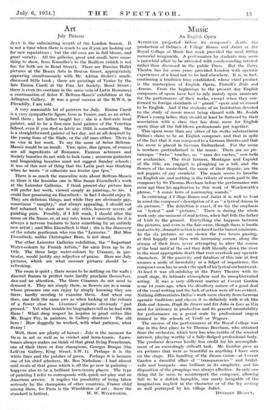Music
An English Opera Auruonon projected before its composer's death, the production of Delius's A Village Romeo and Juliet at the Royal College of Music last week provided the most fitting memorial imaginable. A performance by students may seem a parochial affair to be attended with condescending interest rather than discussed in the public Press. But the Parry Theatre has for some years provided London with operatic experiences of a kind not to be had elsewhere. It is, in fact, continuing a tradition long established, whose chief product is the masterpiece of English Opera, Purcell's Dido and Aeneas. From the beginnings to the present day English composers of opera have had to rely mainly upon amateurs for the performance of their works, except when they con- formed to foreign standards of " grand " opera and so ceased to be English. And if the students of an Institution devoted to the study of music resent being classed with Mr. Josiah Priest's young ladies, they should at least be flattered by their association with a class that has done more for English opera than all the full-blown professionals put together.
This opera more than any other of his works substantiates Delius's claim to be an English composer, and that in spite of the fact that it was composed to a German libretto and that the scene is placed in German Switzerland. For the scene is nowhere particularized in the music. There are no pic- turesque " Swiss " touches, no " ranz des vaches," cow-bells or avalanches. The rival farmers, Montague and Capulet of the title, are engaged in ploughing on a hill, and the flowers of the waste-land, the cause of their dispute, are the red poppies of any cornfield. The music seems to breathe an English air, and nothing in the tribute of words paid to the composer by Sir Thomas Beecham before the performance was more apt than his application to this work of Wordsworth's phrase, " A music born of murmuring sounds."
In criticizing A Village Romeo and Juliet it is well to bear in mind the composer's description of it as " a lyrical drama in six pictures." The definition is exact, if we lay the emphasis on " lyrical " and " pictures." There is during the whole work only one moment of real action, when Sali fells the father of Vreli to the ground. Everything else happens between the pictures, and even in the fair-scene, though there is bustle and activity, dramatic action is reduced to the barest minimum. In the six pictures we are shown the two lovers passing, at first happily and then with increasing sorrow, along the stream of their lives, never attempting to alter the course of the boat until at the end they drift literally down the river to the most appropriate death that ever overtook any operatic characters. If the passivity and fatalism of this tale at first arouses a smile of incredulity or a fidget of impatience, the composer soon has us under the spell of his lyrical enchantment. At least it was all-subduing at the Parry Theatre with its small stage, its intimate atmosphere and its unsophisticated acting. It was a very different matter at Covent Garden some 14 years ago, when the desultory nature of a good deal of the vocal writing and the lack of action were all too evident. Nothing differentiates Delius's work more clearly from German operatic traditions and classes it so definitely with work like Dido and Aeneas, Hugh the Drover and Sir John in Lore as this need for intimacy in production and its general unsuitability for performance on a grand scale by professional singers trained in the schools of Verdi or Wagner.
The success of the 'performances at the Royal College was due in the first place to Sir Thomas Beecham, who obtained from the orchestra, which here has nine-tenths of the musical interest, playing worthy of a fully-fledged professional body. The producer deserves hardly less credit for his accomplish- ment of an exceedingly difficult task. Mr. Gordon gave us six pictures that were as beautiful as anything I have seen on the stage. His handling of the dream-vision—at Covent Garden a dreadful affair of " transparencies " and bridal- veils and bouquets—was brilliant in its simplicity, and his disposition of the groupings was always effective. In only one thing did he seem to misinterpret the composer, allowing Sali to be a doltish bumpkin, one surely incapable of the imagination implicit in the character or of the fey ecstasy so well, portrayed by his village Juliet.
DYNELEY HUSSEY.










































 Previous page
Previous page